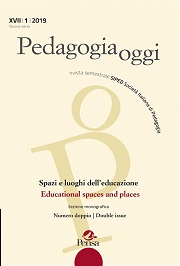From the outside to the inside? The Space of the Self-Formation in Michel Foucault
Abstract
The importance of space as a “pedagogical agent” has been repeatedly emphasised by the educational theory that draws on Foucault’s works: the organization of spaces deeply affects the design of the educational process, conditioning it through different forms of latency. Against this subjectification, the subject can exert either the thought of the outside (which considers the process through which one forms her/himself as a kind of desubjectification) or the care of the self (which is a subjective production based on an invention). These pedagogical grammars – which were long interpreted as opposite phases in Foucaultian thought – are reread, thanks to the most recent scholarship, as connected by a strict ethical-political circularity, that shows the persistence of the thought of the outside in the care of the self. This circularity raises some issues regarding the epistemological identity of pedagogy as a reflection aimed at elaborating a criticalcomprehensive
space of self-formation.




